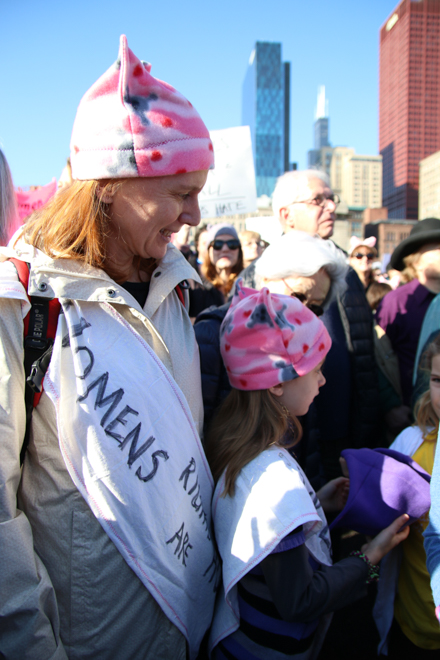Video by Paola de Varona / North by Northwestern
The 1960s brought upon a Second-Wave of Feminism as women took to the streets with protest signs and strong voices to support the Equal Pay Act of 1963 and the liberation of women.
And at 8:30 a.m. on Jan. 21, 2017 on a Chicago red line train, throngs of women gathered to head downtown in hopes of marching for progress like their foremothers once did. They packed into crowded train cars in hopes of keeping the new presidential administration from reverting to a time where women were banned from access to birth control, safe abortions and barred from equal standing in the workplace. The hum in the air was electric. As one woman shouted that there was sign on the way to the Women’s March on Washington that read “You’re so vain you probably think this march is about you,” laughter broke out throughout the train car, while others reminisced about the fact that they hadn’t been to a march since the 1960’s.
Christopher Mayorga, a freshman in SESP, met a Northwestern Medill alumnus who marched in the 1960s when she was a student. Nicole Antony, a Weinberg freshman, recalled the tales of an older woman on the train who told her she had marched 50 years ago, reminding her youthful counterparts to remain peaceful and refrain from provoking the police. The wise and young were coming together, as Northwestern students on trains across the city were gearing up to march that very afternoon. For many it would be their first protest.
When the train reached the Jackson stop, passengers donned in their Northwestern Women’s Center pins and pink hats piled out onto the street to meet the other estimated 250,000 individuals who came out early on a Saturday morning to Chicago’s sister march, to be a part of over a million people who demonstrated around the world in solidarity with the women of the U.S.
Together these women, men, children, families and people from all walks of life flooded the streets of downtown Chicago; occupying Michigan Avenue, shutting down Grant Park and closing streets all throughout the Loop. They were loud simply in sheer numbers, as the sky became a backdrop for political statements waving on signs above shoulders.

Everywhere smiles were an unspoken requirement, as children rose high above the crowds on shoulders and women discovered a tangible sisterhood with the people around them. A young girl was accompanied by her mother with their homemade sign, “We are people, not toys!”, while expecting mothers held their stomachs as they chanted in hopes of a better future for their unborn. Leslie Webster of Hyde Park came to the march with her daughter Ashley and the two were giving away homemade "pussy hats" made by Webster to marchers.

Leslie and Ashley Webster pictured above.
Photo by Mia Zanzucchi
At 11:30 a.m. all bridges into Grant Park were at a standstill as the eagerness to march itched at their feet and the park was deemed full to capacity. It seemed as though there would be no viable way to march until the crowds began to spill over into Michigan Avenue, sending protesters onto their route throughout the city. As soon their feet crossed over the bridges they stood on, Chicago was alive with their chants of “my body, my choice” and “this is what democracy looks like.” They rallied their way through the city, watching as the CPD stopped traffic and closed down streets. One bus driver in a closed down alley had “this driver supports women” written across the side of his door, beeping and smiling as the protesters walked by and waved.
Lucy Evans, a Bienen freshman, said she thought it was encouraging to see those inside the stopped cars rolling down their windows and joining in the chants, rather than being angry at the protesters. On the sidelines women yelled “fight like a girl” as others walked past, little girls stood with signs while bystanders watched, astonished at the staggering force of this angry electorate bringing the city to a temporary halt.
As news stations helicoptered overhead and marchers gained in numbers by the thousands completely shattering the organizers initial estimate of 50,000 protesters, the marchers had won. As they danced, cheered and carried themselves with a contagious positivity and light they knew their voices had been heard. After speaking to dozens of Northwestern students whom offered their stories of the day, one thing was clear: they marched because they refused to be silent about the threats to their fundamental rights as women, people of color, immigrants, LGBTQ and as human beings. Every single person wanted to be a part of a history that moved forward. They heard Obama’s rallying crying when he said, “Lace up your boots and do some organizing.” They listened.
They listened when Donald Trump made threats against abortion laws,immigration laws and healthcare. They listened when he degraded women. They listened when many said they couldn’t turn their tweets and Facebook posts into political power. They listened and intersected communities to march alongside sisters and brothers of every creed.
Event co-chair Ann Scholhamer told the crowd a little before 11 a.m., “We called, and you came.”
And even as many argued protests were pointless and futile, they rose and did what Americans know to do when they feel their voices aren’t being listened to; they spoke louder and showed the world, this is what democracy looks like.